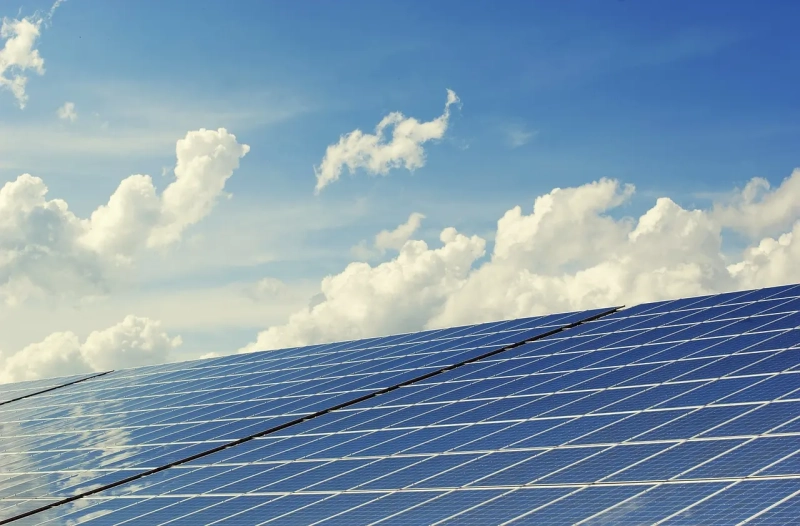
Solar Energy Systems

Today, with the increasing need for energy, the need for sustainable and environmentally friendly energy sources is increasing. In this context, solar energy is the most widely used renewable energy source today. Solar energy is an energy source used to generate electrical energy using the sun's light and heat. In this article, "What is Solar Energy?" will be discussed.
What is Solar Energy?
Solar energy is an energy source used to generate electrical energy using the sun's light and heat. Solar energy is collected through photovoltaic (PV) solar panels or concentrated solar power (CSP) technology.
How Does Solar Energy Work?
Photovoltaic solar panels are a technology that converts sunlight directly into electrical energy. PV panels are mostly made of silicon-based semiconductor materials. Light falling on the solar panels moves electrons in the photovoltaic cells. This movement is captured by wires and other components in a circuit and used as electrical energy.
Concentrated solar power (CSP) is a technology in which mirrors concentrate sunlight. This concentrated light is transported through a system of pipes and vaporized in an evaporator. This vapor is combined with a turbine and connected to a generator to generate electricity.
Types of Solar Energy
Photovoltaic (PV) Solar Energy
Photovoltaic (PV) solar energy is a technology in which solar energy is directly converted into electrical energy. The advantage of this technology is its capacity to generate electricity from sunlight.
Concentrated Solar Power (CSP)
Concentrated solar power (CSP) is a technology in which mirrors concentrate sunlight. The advantage of this technology is that high temperatures can be achieved.
Advantages and Disadvantages of Solar Energy Advantages
Advantages
Solar energy is an environmentally friendly energy source. Therefore, it helps to reduce the use of fossil fuels. Furthermore, solar energy is an unlimited resource and is a natural resource of the sun. Solar energy can be used in many places and will continue to generate electricity as long as the sun is shining.
Disadvantages
Solar energy can be affected by weather conditions. On cloudy or rainy days, the efficiency of solar panels decreases. The cost of solar panels is also high and installation costs can be higher compared to other energy sources.
Solar Energy Usage Areas
Solar energy can be used in many different areas. It is used in homes, businesses, farmland and even in space. Solar energy can be used as electrical energy or it can also be used for hot water or heating.
Solar Energy Production and Installation
Solar panels can provide years of trouble-free operation when installed correctly. Installation of solar panels is recommended to be done by a professional team, as the right equipment, the right techniques and the right materials must be used.
Solar Energy and the Environment
Solar energy is an environmentally friendly option compared to other energy sources. Solar panels help reduce the use of fossil fuels and reduce the amount of carbon emissions released into the atmosphere. It is also advantageous that the materials used in the production of solar panels are recyclable.
Solar Energy and Economy
Solar energy is an economical option in the long run. The cost of solar panels is decreasing every year, leading to an increasing use of solar panels. Furthermore, the installation of solar panels can result in lower energy bills in the long run and even loans that can be repaid by energy companies.
Solar Energy Future
Solar energy will be one of the most important energy sources of the future. Increasing technological advances will increase the efficiency and reduce the costs of solar panels. In addition, the production of solar panels will become increasingly environmentally friendly. Solar energy is a technology that will shape the future of the energy sector.
Solar Energy Conclusion
Solar energy is an environmentally friendly energy source and can be used in many different areas. The cost of solar panels is decreasing every year and is an economical option in the long term. Solar energy is a technology that will be one of the most important energy sources of the future and will shape the future of the energy sector.
Solar Energy Frequently Asked Questions
How much does it cost to use solar energy?
The cost of solar panels varies depending on the size and type of panel. However, the cost of solar panels is decreasing every year and is an economical option in the long run.
How efficient is solar energy?
Solar energy can provide years of trouble-free operation when installed correctly. However, the efficiency of solar panels can be affected by weather conditions.
What is the lifespan of solar panels?
The lifespan of solar panels varies depending on the quality of the panel and the conditions of use. However, most solar panels can operate for at least 25 years.
Are solar panels difficult to install?
The installation of solar panels can be easily accomplished with the help of a professional team. Installation time and cost can vary depending on the size and type of panels.
How to maintain solar panels?
Maintenance of solar panels is quite easy. It is enough to clean the panels and check them regularly. Also, depending on the weather conditions in the region where the panel is located, the maintenance of the panel may vary.
How much energy can solar panels produce?
The amount of energy produced by solar panels varies depending on the size and type of panel and the amount of sunlight in the area where it is located. However, solar panels can usually produce enough energy and reduce energy bills.
Why is the use of solar energy important for the environment?
The use of solar energy helps to reduce the use of fossil fuels and reduces the amount of carbon emissions released into the atmosphere. It is also advantageous that the materials used in the production of solar panels are recyclable. For these reasons, the use of solar energy is important for the environment.
 Türkçe
Türkçe English
English Russian
Russian
 Web Tasarım Tarafından Hazırlanmıştır.
Web Tasarım Tarafından Hazırlanmıştır.